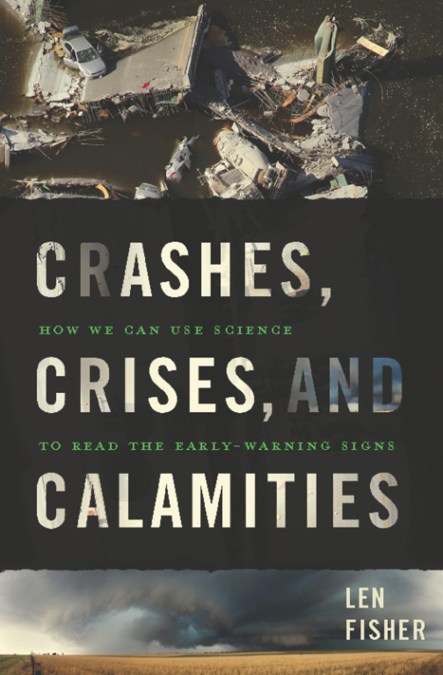Shopping Cart
Crashes, Crises, and Calamities
How We Can Use Science to Read the Early-Warning Signs
Description
Why do certain civilizations, societies, and ecosystems collapse? How does the domino effect relate to the credit crunch? When can mathematics help explain marriage? And how on earth do toads predict earthquakes? The future is uncertain. But science can help foretell what lies ahead.
Drawing on ecology and biology, math and physics, Crashes, Crises, and Calamities offers four fundamental tools that scientists and engineers use to forecast the likelihood of sudden change: stability, catastrophe, complexity, and game theories. In accessible prose, Len Fisher demonstrates how we can foresee and manage events that might otherwise catch us by surprise.
At the cutting edge of science, Fisher helps us find ways to act before a full-fledged catastrophe is upon us. Crashes, Crises, and Calamities is a witty and informative exploration of the chaos, complexity, and patterns of our daily lives.
Drawing on ecology and biology, math and physics, Crashes, Crises, and Calamities offers four fundamental tools that scientists and engineers use to forecast the likelihood of sudden change: stability, catastrophe, complexity, and game theories. In accessible prose, Len Fisher demonstrates how we can foresee and manage events that might otherwise catch us by surprise.
At the cutting edge of science, Fisher helps us find ways to act before a full-fledged catastrophe is upon us. Crashes, Crises, and Calamities is a witty and informative exploration of the chaos, complexity, and patterns of our daily lives.
Newsletter Signup
By clicking ‘Sign Up,’ I acknowledge that I have read and agree to Hachette Book Group’s Privacy Policy and Terms of Use
Praise
Scott M. Cooper, MIT Research Affiliate, co-author of Coolhunting
“With this third book in his trilogy of exploration into how to address some of society's most complex and vexing problems, Len Fisher challenges us to rethink how science and mathematics is used in what might be called ‘crisis prediction and management.' This book is getting me to rethink some of my own work.”
Simon A. Levin, Moffett Professor of Biology, Princeton University; author ofFragile Dominion
“Fisher is a master story-teller, making difficult scientific concepts seem simple through elegant exposition. Crashes, Crises, and Calamities addresses the challenge of disaster prediction in socio-economic, ecological, and physical systems by a brilliant and engaging integration of diverse scientific perspectives.”
Ian Stewart, author of Professor Stewart's Cabinet of Mathematical Curiosities
“Len Fisher is a natural storyteller, and his tales about the mathematics of crashes, crises, and calamities keep the pages turning. A great way to find out what the world's mathematicians are doing to forecast and prevent disasters of all kinds.”
Yaneer Bar-Yam, Professor and President, New England Complex Systems Institute
“Excellent discussion of the most important problem of our time.”
“With this third book in his trilogy of exploration into how to address some of society's most complex and vexing problems, Len Fisher challenges us to rethink how science and mathematics is used in what might be called ‘crisis prediction and management.' This book is getting me to rethink some of my own work.”
Simon A. Levin, Moffett Professor of Biology, Princeton University; author ofFragile Dominion
“Fisher is a master story-teller, making difficult scientific concepts seem simple through elegant exposition. Crashes, Crises, and Calamities addresses the challenge of disaster prediction in socio-economic, ecological, and physical systems by a brilliant and engaging integration of diverse scientific perspectives.”
Ian Stewart, author of Professor Stewart's Cabinet of Mathematical Curiosities
“Len Fisher is a natural storyteller, and his tales about the mathematics of crashes, crises, and calamities keep the pages turning. A great way to find out what the world's mathematicians are doing to forecast and prevent disasters of all kinds.”
Yaneer Bar-Yam, Professor and President, New England Complex Systems Institute
“Excellent discussion of the most important problem of our time.”
